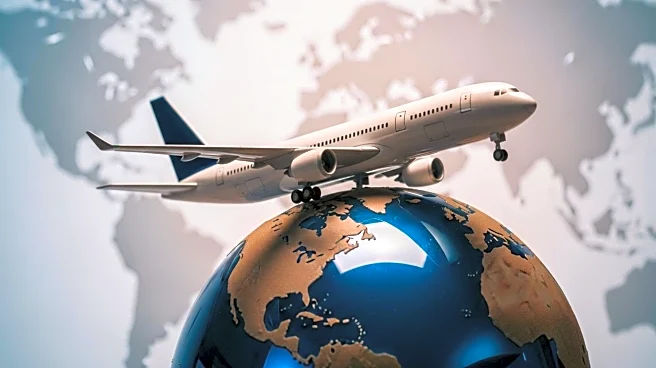What's Happening?
The International Air Transport Association (IATA) has released a study indicating that supply chain challenges are significantly impacting the airline industry, with costs expected to exceed $11 billion by 2025. The study, conducted in collaboration with management consultancy Oliver Wyman, highlights delays in aircraft production and parts supply as key factors forcing airlines to reconsider fleet plans and extend the operational life of older aircraft. The commercial backlog for aircraft reached over 17,000 units in 2024, a substantial increase from previous years. The study identifies four main cost drivers: excess fuel costs from less efficient aircraft, increased maintenance expenses, higher engine leasing costs, and surplus inventory holding costs. Additionally, geopolitical instability, raw material shortages, and labor constraints are exacerbating these challenges.
Why It's Important?
The financial burden of supply chain delays on airlines is substantial, affecting their ability to meet growing passenger demand. With passenger demand increasing by 10.4% in 2024, airlines are struggling to expand capacity, leading to higher load factors and potential service disruptions. The study suggests that addressing these supply chain issues is crucial for maintaining industry resilience and competitiveness. Airlines, manufacturers, and suppliers must collaborate to enhance supply chain visibility, adopt predictive maintenance, and explore alternative parts solutions. The broader impact includes potential shifts in fleet management strategies and increased operational costs, which could affect ticket prices and profitability.
What's Next?
IATA and Oliver Wyman recommend several initiatives to mitigate supply chain disruptions, including opening up maintenance, repair, and overhaul (MRO) services, improving data usage for early problem detection, and expanding repair and parts capacity. These measures aim to reduce downtime and optimize inventory management. Stakeholders are encouraged to adopt a strategic approach to reshape the aerospace industry's supply chain structure, focusing on transparency and talent development. The success of these initiatives will depend on collective efforts from airlines, manufacturers, and suppliers.











